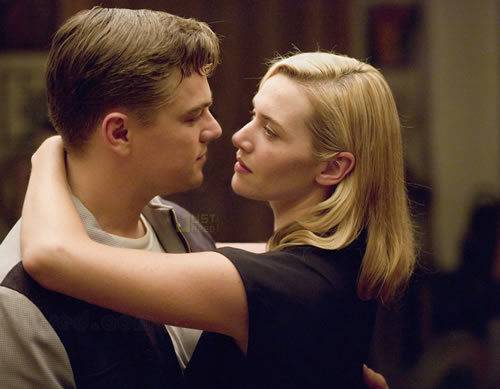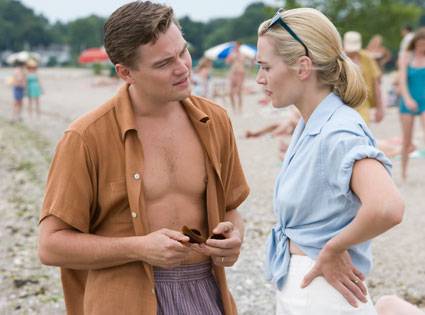 I was surprised when Revolutionary Road was snubbed an Oscar nomination for Best Picture, but after thinking about it, I guess I shouldn’t be. The Oscars frequently fail to acknowledge the most deserving films, so why alter form now?
I was surprised when Revolutionary Road was snubbed an Oscar nomination for Best Picture, but after thinking about it, I guess I shouldn’t be. The Oscars frequently fail to acknowledge the most deserving films, so why alter form now?
While it may not be the best picture of the year, Revolutionary Road certainly is among the stand-outs in a year of several good films. The movie possesses all the key ingredients for a knock-out Best Picture: a compelling story, gritty conflict, thought-provoking poignancy, and moving performances by brilliant actors. But the movie’s message is most likely the reason the Academy placed their votes elsewhere — they simply didn’t “get” it.
It would be easy to pass off the story of April and Frank Wheeler as a tale about a married couple who should’ve saved themselves the squabbling and gotten a divorce. But what makes this a decent flick is the message beneath the surface, offering no simple solution, and serving as a sort of cautionary tale.
April (Kate Winslet) makes a terrible mistake. She falls in love with Frank Wheeler (Leonardo DiCaprio). It all starts with a silent glance across the room, and it ends much in the same way. Frank sweeps April off her feet at a party with his philosophy about life. He tells her he’s going back to Paris the first chance he gets. “People are alive there,” he says. “I want to feel things, April. How’s that for an ambition?” When she asks him what interests him, Frank gives her a witty comeback about how he hasn’t yet figured that out. And he never does.
Fast-forward about six years. Frank and April are married with two kids, living in a perfect white house in the suburbs. Frank works at a dull job he hates in the city, and April is a housewife and stay-at-home mom. It’s 1955, and this is commonplace; for many people, it doesn’t get any better than this. But for April and Frank, it’s not enough.
April aspires to be an actress, but isn’t very good. After the curtain falls on a disappointing play, Frank greets April with a sarcastic remark about the quality of the show. When they walk down the hall together afterwards, the distance between them is palpable. That night, they engage in a torrid fight about where their lives are going and their failed expectations. It is the first domino that sets off a string of events, culminating with the life-changing solution to move to Paris to find a better life. April plans to be a secretary and support the family when they move to Paris; she suggests to Frank that he can finally take the time off he needs to discover what he really wants to do. Life is suddenly sunny for the Wheelers again, but it is essentially the calm before the storm.
 It’s the subtleties of Revolutionary Road that drive home the poignancy of the film. Director Sam Mendes often makes deliberate shots to show us what’s going on beneath the surface, and to profound effect. Near the end of the film, there is a scene standing on end with electricity; two people observe the room in complete silence except for two sounds: April stirring eggs in a bowl, and the boiling coffee pot in the foreground. The two juxtaposing elements are magnified by the silence, and the look on April’s face tells us not only what is going on in her head, but what she’s planning to do next. The scene is masterfully played by Winslet and DiCaprio, resulting in an emotional climax.
It’s the subtleties of Revolutionary Road that drive home the poignancy of the film. Director Sam Mendes often makes deliberate shots to show us what’s going on beneath the surface, and to profound effect. Near the end of the film, there is a scene standing on end with electricity; two people observe the room in complete silence except for two sounds: April stirring eggs in a bowl, and the boiling coffee pot in the foreground. The two juxtaposing elements are magnified by the silence, and the look on April’s face tells us not only what is going on in her head, but what she’s planning to do next. The scene is masterfully played by Winslet and DiCaprio, resulting in an emotional climax.
While it goes without saying Kate Winslet and Leonardo DiCaprio are electrifying in their roles, the film is packed with moving performances. One of the stand-outs has to be Michael Shannon, who plays the son of the nosey realtor who sold April and Frank their house. As John Givings, Shannon steals every scene he’s in. His character is not afraid to say what he sees in people, and though he’s supposed to be certifiably crazy, he seems to be the person with the most sense in the movie. He is the voice of clarity for April and Frank, and his words prove to be one of the final stepping stones for the movie’s tragic finale.
Personally, I believe anybody who wants to get married should be forced to watch this film. Adapted from the landmark novel by Richard Yates, Revolutionary Road warns us what can happen when two people don’t communicate with each other, and also reminds us that if you want to chase your dreams, you must make sacrifices. You can’t have your cake and eat it, too. It’s a film that warns us not to settle — do what makes you happy, or you will have sentenced yourself to a life of being settled; a thing, perhaps, far too many people live with every day.








